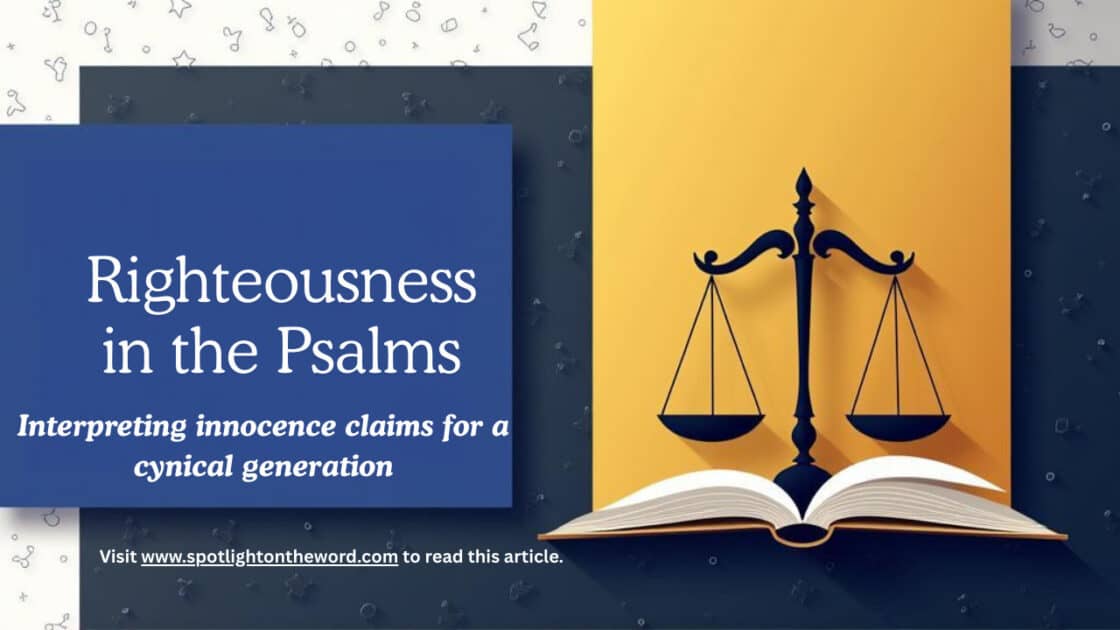RIGHTEOUSNESS IN THE PSALMS: ARE INNOCENCE CLAIMS WARRANTED?
By Michael Annan Kasukose | Spotlight on the word
[Editor’s note] We live in an era where self-righteousness is seen as boastful and arrogant. Are the consistent claims of innocence made by the psalmists in the Bible valid or misguided? Were they seeking vainglory via emphasis on their personal sinless perfection, or were they minded of their dependency on the mercy and grace of God, seeking vindication from Him against wicked and immoral men? Let us briefly consider this.
Introduction
In a world where authenticity is prized and suspicion is widespread, innocence is often met with skepticism and disbelief. The Psalms – those ancient songs of raw emotion and spiritual honesty–present a particular challenge to modern readers when they boldly proclaim the psalmist’s righteousness, blamelessness, and integrity. In an era where self-awareness is emphasized and self-righteousness sounds arrogant, such claims can feel distasteful.
Are these songs echoes of spiritual arrogance, or do they offer something more profound?
Perhaps even you, our dearest reader, have often felt that these psalmists were boasting or blowing their own trumpets before God.
Thesis
This study contends that the so-called “self-righteous” passages in Psalms, such as those in Psalms 7, 17, 18, 26, and 44-are not self-congratulatory boasts but covenantal cries of integrity, actual circumstantial pleas for vindication, and poetic complaints against false accusations. Rather than portraying moral perfection, they voice the experience of the faithful who are unjustly attacked despite their imperfections.
Interpreted in light of Israel’s covenant with God, these statements are not examples of pride but honest prayers expressing trust in God and unity among His people.
Do the Psalms Contain Self-Righteous Boasting?
The short answer is no; the Psalms do not contain self-righteous boasting. While several Psalms feature the writer(s) affirming personal righteousness, these affirmations are neither prideful nor self-exalting. Instead, they are honest expressions of faithfulness to God, showing a clear difference from the wicked and a deep trust in God’s justice.
The following are some relevant points that help clarify our position:
- Righteousness in the Psalms: Not Self-Righteousness
The righteousness claimed in the Psalms is not self-righteousness but covenantal righteousness. The writers recognized that their standing with God depended on His mercy and grace.
Let us first understand self-righteousness from Proverbs 30:12 and Luke 10:29:
Proverbs 30:12: There is a generation that is pure in its own eyes, Yet is not washed from its filthiness.
Luke 10:29: But he, wanting to justify himself, said to Jesus, […].
As seen in these verses, the Bible portrays people who view themselves as morally right or seek to justify themselves, even though they remain guilty before God – this captures the heart of self-righteousness.
Self-righteousness is the attitude of thinking oneself clean and morally right in one’s own eyes while ignoring or denying one’s true guilt and the need for God’s mercy.
This distinction is crucial in this study. When David says things like “I have walked in my integrity” (Psalm 26:1), he is not claiming sinless perfection but affirming his faithful allegiance to God’s law in the face of persecution or false accusations. Simply stated, innocence and righteousness are contextual. As one writer beautifully puts it; “The innocence is relative to the accusations being made, rather than absolute.” – (see ESV Commentary on Psalms 7)
For example, Psalms 7:3-5 reads:
If there is iniquity in my hands,
If I have repaid evil to him who was at peace with me,
Or have plundered my enemy without cause,
Let the enemy pursue me and overtake me;
Yes, let him trample my life to the earth,
And lay my honor in the dust. Selah
These verses show that David does not claim to be sinless. Instead, he is asserting his innocence in relation to specific accusations.
- Righteousness as a Contrast to the Wicked
The Psalms often highlight the stark contrast between the righteous and the wicked. This contrast is not for self-promotion but serves to uphold God’s justice and the blessings of obedience. For instance, Psalms 1 opens with the following:
“Blessed is the man who walks not in the counsel of the wicked […] but his delight is in the law of the Lord…” (Psalms 1:1–2).
This sets the tone for the entire book: the way of the righteous and the way of the wicked. It affirms the value of God’s law and the blessings of meditating on it. The word wicked used in Psalm 1 designates a person who is morally wrong, hostile to God’s standard (violates covenant obligations), and liable to divine judgement. Same applies to terms such as “sinner,” and “fool.”
Now, let us consider the word “righteous.” It is applied to those members of the people who embrace the covenant from the heart, have sincere faith, and seek to please the Lord in their conduct and character (Deut. 6:25; 24:13; Isa. 1:21, 26; 5:7; Hab. 2:4; Zeph. 2:3; Mal. 3:3). The ESV Commentary outlines four usages of “righteous” in Psalms:
- Covenant people vs. Gentiles
- Faithful individuals within Israel
- Exemplary figures (like kings)
- Innocent parties in legal disputes
Thus, the righteous adhere to God’s revealed will and are declared blessed.
- Expressions of Integrity Are Contextual and Often Defensive
The psalmists often found themselves in dire circumstances, where they were persecuted, falsely accused, or surrounded by enemies. In such contexts, declarations of integrity are pleas for divine vindication rather than boastful claims of superiority.
For example, Psalms 17:1-3
Hear a just cause, O Lord,
Attend to my cry;
Give ear to my prayer, which is not from deceitful lips.
Let my vindication come from Your presence;
Let Your eyes look on the things that are upright.
You have tested my heart;
You have visited me in the night;
You have tried me and have found nothing;
I have purposed that my mouth shall not transgress
David appeals to God’s judgement, not his own merit, affirming that God has already tested him and found no wrongdoing. His words are not proud boasts but humble and honest defenses in the face of unjust threats. These statements reflect a plea for divine vindication rather than a claim of moral perfection. The psalmists often express blamelessness in specific situations, especially when wrongly accused, not to exalt themselves but to call upon God’s justice. Their declarations of integrity are not rooted in self-righteousness but in a sincere desire for truth to be upheld by the One who sees the heart.
- Confessions of Sin and Dependence on Mercy
Any appearance of self-righteousness is fully tempered by the deep confessions of sin throughout the Psalms. David, for example, openly confesses:
“Have mercy upon me, O God… For I acknowledge my transgressions…” (Psalms 51:1–3).
The penitential psalms (e.g., Psalms 6, 32, 38, 51, 130, and 143) demonstrate deep humility and recognition of sin in the hearts of their writers. Thus, the overall tone of the Psalms is not one of self-righteousness but of humble reliance on God’s grace and a commitment to walk faithfully.
- Vindication, Not Vainglory
The Psalmists often seek vindication from God because they trust in His justice, not because they believe they are perfect:
“Vindicate me, O Lord, for I have led a blameless life…” (Psalms 26:1).
The psalmist’s call for vindication is not a challenge to God but a cry for justice based on covenantal loyalty. The heart is open before God. “We need not assume the Psalmists are deceived or lying… they are completely in the right – as against their particular enemies.”
Conclusion
The Psalms do not contain self-righteous boasting. Instead, they contextually present the following:
- Covenant-based declarations of integrity
- Honest confessions of sin
- Bold prayers for justice and mercy
- A clear distinction between the righteous (faithful) and the wicked (rebellious)
The righteousness of the psalmists are always understood in light of God’s character, His law, and His mercy, and not in human pride.
Further Reading
- World Video Bible School. (pdf page 14-15). The Book of Psalms: Course Notes. WVBS. https://www.wvbs.org
- https://www.crossway.org/articles/do-the-psalms-contain-self-righteous-boasting-psalms-7-17-and-26/?utm_source=Crossway+Marketing&utm_campaign=802d592ba7-20250314+Gen-DothePsalmsContainSelfRighteousB&utm_medium=email&utm_term=0_-802d592ba7-527384986 (Accessed 15/03/25, 15GMT)
- Arndt, W., Danker, F. W., Bauer, W., & Gingrich, F. W. (2000). A Greek-English Lexicon of the New Testament and Other Early Christian Literature (3rd). University of Chicago Press, page 218. https://www.agathonlibrary.com/wp-content/uploads/2022/05/BDAG-A-Greek-English-Lexicon-of-the-New-Testament-and-Other-Early-Christian-Literature-Walter-Bauer-Frederick-William-Danker-etc.-z-lib.org_.pdf (Accessed, 15/03/25, 17GMT)
- Thayer, J. H. (1889). Thayer’s Greek-English Lexicon of the New Testament (STRONGS NT 5243: ὑπερηφανία) https://biblehub.com/thayers/5243.htm? (Accessed, 15/03/25, 16GMT)






